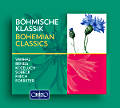ORFEO International – Catalogue
CDs
Bohemian Classicism
During the early Classical period, the focus of the European music world shifted. Whereas during the Baroque era Italy, France and Germany – the core areas of the courts of absolutistic rulers – had dictated the rhythm, the strengthening of the bourgeoisie was accompanied by a new music aesthetics that departed from pompous Baroque ideas. 
MP 1802Even at Mozart’s time, Prague was considered one of the most important ‘music cities’ in the world. The composers on this album also had a share in this development. Among them, Johann Baptist Vanhal occupies a special position. He was one of the most successful artists of his time and one of the first musicians to be able to live from the income from their compositions and music lessons. In this, he was a model for Mozart and Beethoven. By contrast, František Benda was a member of the court orchestras of August the Strong and later Frederick the Great. Leopold Koželuch was one of the most productive composers of the 18th century, a pioneer in many fields and a progressive mind. Johann Sobeck was born in the vicinity of Karlsbad (Karlovy Vary), but made a career at the Royal Theatre of Hanover. He worked for more than 50 years in the Lower Saxon provincial capital. Ždenìk Fibich was a contemporary of Anton Dvoøák, so he epitomizes Romanticism in music. As a significant representative of a Czech national style in music, today he is just as undeservedly under-represented as Joseph Bohuslav Foerster, who was a close friend of Gustav Mahler.
|